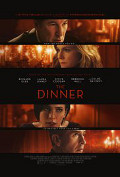
Directed by
Oren Moverman
120 minutes
Rated M
Reviewed by
Bernard Hemingway

The Dinner
Synopsis: Brothers Stan (Richard Gere) and Paul Lohman (Steve Coogan) with their wives Katelyn (Rebecca Hall) and Claire (Laura Linney) meet at an exclusive restaurant to discuss a family crisis.
Director and writer Oren Moverman certainly knows how to make things difficult for himself and us. Although the film is divided into chapters that match a five course menu, the food is peripheral, indeed is barely touched while one or more of the party is away from the table most of the time; the film not only jumps about chronologically but takes lengthy side trips to the American civil war and other maters; gratuitous background music plays through much of the film, at times obscuring the dialogue and, finally, well-known British comedian Steve Coogan is cast as an American. Given so many seemingly inexplicable mis-judgements it’s surprising that The Dinner works as well as it does.
Let’s start with the failings. Given that there is such a well-established traditions of films centered on food and dinner parties why, particularly when you call your film “The Dinner” would Moverman largely squander the opportunity to use this both highly formalized and sensorily stimulating social event to add rhythm and, to pun somewhat, flavour to his main story, Peter Greenaway’s 1989 film The Cook, The Thief, The Wife and Her Lover, comes immediately to mind of the kind of thing I mean. All we get here are classically cursive sur-titles identifying the course and haute nouvelle cuisine dishes which are described with what I presume is parodic relish by the maitre d' (Michael Chernus) but barely even seen, let alone consumed. Frankly, the whole shebang could have been substituted with any other social event in which the four protagonists were compelled by good manners to keep company with each other (one might frutfully compare it with Polanski’s Carnage, 2011, which was set in an apartment)
And what’s with Paul’s morbid fixations? Gettysburg and history as a litany of death and so forth. He is the only one of the four characters who gets a back-story but he does so to little point, He is supposed to be suffering from a mental illness but of what stripe we are never told and once again, although he seems profoundly disaffected by his life, mentally illness isn't really of relevance. Perhaps in Herman Koch best-selling 2009 novel which was the source for Moverman’s script all this was better developed, the internecine Civil War standing in Paul’s mind as a metaphor for his relationship with his brother but here it seems to be shoe-horned in with no particular gain.
And why Coogan? Surely there are any number of American actors who would have filled the role perfectly well. Coogan has previously essayed more “serious” roles notably in Philomena (2013) but here he remains essentially his dryly misanthropic self (he can be seen in characteristic form in the currently screening The Trip to Spain). It’s very engaging if you like that sort of thing but he brings nothing to the role of a supposedly mentally-ill man other than a more embittered version of that persona The effect is more like watching Coogan doing one of his clever impressions than dramatically realizing his character.
Despite all this,once Moverman has joined all the dots and we finally understand the purpose of the dinner, the film develops some real heft as Gere, Linney and Hall get to work (it is no accident that Coogan retires into the shadows) and play out the emotional and moral complexities of the situation in which the two families find themselves. This latter part of the film is quite rivetting as it exposes the realities of things people do, out of stupidity, anger, selfishness, idealism and, finally, love, in the hot-house context of the nuclear family.
The film’s abrupt ending if not a complete disappointment feels a little too much like a short-changing response to the vexatiously messy moral dilemma that it has initiated. Yes, we can draw our own conclusions but its Moverman’s that we want, and deserve, to know. Or perhaps we should just seek out Koch’s novel which, I suspect, is a lot more successful than this film.

Want more about this film?


Want something different?




